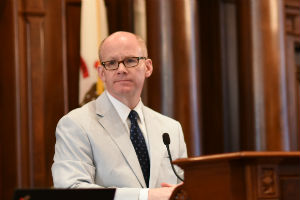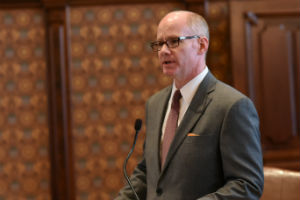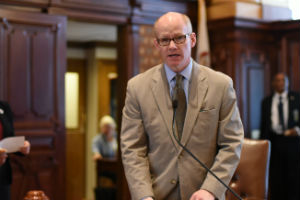- Details
- Category: News
 SPRINGFIELD – Legislation providing access to medical alternatives to opioids as a means to combat the opioid crisis became law today, making Illinois the first state in the nation to enact such a measure.
SPRINGFIELD – Legislation providing access to medical alternatives to opioids as a means to combat the opioid crisis became law today, making Illinois the first state in the nation to enact such a measure.
State Senator Don Harmon (D-Oak Park) sponsored the legislation, which creates a pilot program allowing individuals over the age of 21 with any condition for which opioids might be prescribed to apply for temporary access to the state’s medical cannabis program.
“The opioid crisis is getting worse at an alarming rate,” Harmon said. “People dealing with severe pain and other medical conditions are looking for relief, and it is becoming increasingly clear that opioids may not be the safest treatment. We must be open to any reasonable alternative, and I am thankful for the support I received on both sides of the aisle for this legislation, and to the governor for signing it into law.”
New data from the U.S. Centers for Disease Control shows that opioid deaths are on the rise nationwide, with an estimated 72,000 people dying of an opioid-related overdose in 2017, including a 10 percent increase in deaths in Illinois.
Under the program, patients will obtain a physician’s certification that they have a condition for which an opioid could be prescribed. They may then take that to a dispensary to receive medical cannabis for a fixed period of time.
“Studies show that opioid dependence can develop within a week or even a few days of use,” Harmon said. “This law gives people a chance to act quickly and pursue another treatment option if they choose.”
To help clean up the backlog of applications for the full medical cannabis program at the Illinois Department of Public Health, the measure also allows anyone with a qualifying condition for the medical cannabis program to take physician certification to a dispensary to receive cannabis on a provisional basis while their application is processed.
Senate Bill 336 takes effect immediately.
- Details
- Category: News
 SPRINGFIELD – A new law sponsored by State Senator Don Harmon (D-Oak Park) ensures local communities benefit from the tax revenue generated by Illinois’ solar industry.
SPRINGFIELD – A new law sponsored by State Senator Don Harmon (D-Oak Park) ensures local communities benefit from the tax revenue generated by Illinois’ solar industry.
“Solar energy is a rapidly growing industry in Illinois, and it’s good not only for the environment but also for the economy,” Harmon said. “It is my hope that the revenue generated from this industry can benefit local schools and communities and encourage the continued growth of solar power in our state.”
The legislation, which became law on Friday, sets a standard tax assessment value for commercial solar farms located anywhere besides Cook County. This creates certainty around the revenue that local governments will receive from the farms.
Under the legislation, solar farms could generate $250 million to $300 million in tax revenue over a 25-year span, money that would go to funding schools, roads and other critical services.
Senate Bill 486 takes effect immediately.
- Details
- Category: News
 SPRINGFIELD – State Senator Don Harmon (D-Oak Park) issued the following statement in response to the U.S. Supreme Court ruling in favor of Mark Janus today, dealing a major blow to unions across the country:
SPRINGFIELD – State Senator Don Harmon (D-Oak Park) issued the following statement in response to the U.S. Supreme Court ruling in favor of Mark Janus today, dealing a major blow to unions across the country:
“I had hoped that a conservative Supreme Court would hew to the bedrock conservative law and economics principles I learned at the University of Chicago Law School, but it would seem Bruce Rauner’s obsessive anti-union agenda has inspired them to liberal judicial activism.
“The law should not support economic “free riders”—those who benefit from services for which they do not pay. The Janus decision is an affront to that principle. It allows workers to reap the benefits of collective bargaining without paying for the efforts it takes.
“Republicans in Congress fought hard to delay hearings and deny Barack Obama his Supreme Court pick, and they were not disappointed today. It’s a shame that the U.S. Supreme Court is now, like Congress, just another appendage of the Trump White House. So much for the brilliant separation of powers the framers laid out in the Constitution.”
- Details
- Category: News
 SPRINGFIELD – Legislation providing access to medical alternatives to opioids as a means to combat the opioid crisis is headed to Gov. Bruce Rauner’s desk.
SPRINGFIELD – Legislation providing access to medical alternatives to opioids as a means to combat the opioid crisis is headed to Gov. Bruce Rauner’s desk.
Senator Don Harmon (D-Oak Park) passed the Alternatives to Opioids Act out of the Senate in April and worked closely with the Department of Public Health and the House sponsor to address any concerns before bringing it for a final vote today.
The measure creates a pilot program allowing individuals over the age of 21 with any condition for which opioids might be prescribed to apply for temporary access to the state’s medical cannabis program.
“Opioid addiction takes the lives of thousands of Illinoisans every year,” Harmon said. “We should be open to any reasonable alternative treatment – and no one has ever died of a cannabis overdose.”
Under the program, patients will obtain a physician’s certification that they have a condition for which an opioid could be prescribed. They may then take that to a dispensary to receive medical cannabis for a fixed period of time.
To help clean up the backlog of applications for the full medical cannabis program at the Department of Public Health, the measure also allows anyone with a qualifying condition for the medical cannabis program to take physician certification to a dispensary to receive cannabis on a provisional basis while their application is processed.
A study conducted by the Centers for Disease Control last year found that a patient can become addicted to opioids within a week or even a few days of use.
“It’s imperative that we give people the immediate option to pursue an alternative treatment to opioids,” Harmon said. “Opioid dependence can develop quickly and has devastating effects.”
Senate Bill 336 passed both the House and Senate with bipartisan support and now awaits the governor’s signature.
- Details
- Category: News
 SPRINGFIELD – State Senator Don Harmon (D-Oak Park) voted today to approve a bipartisan, balanced budget.
SPRINGFIELD – State Senator Don Harmon (D-Oak Park) voted today to approve a bipartisan, balanced budget.
The budget is balanced through a combination of spending cuts and pension reform. It restores funding to vital human service programs and fully funds K-12 and higher education.
“It is a breath of fresh air to vote on a budget package that was the result of bipartisan negotiations rather than partisan bickering,” Harmon said. “I am encouraged by our efforts to continue the stability we put in place last year, and I hope the people of Illinois are as well. ”
Included in the budget is $350 million in new funding for public schools, in line with the new education funding formula passed last year, as well as $50 million for early childhood education.
The plan also rolls back Gov. Bruce Rauner’s 10 percent cut to the Local Government Distributive Fund, resulting in approximately $120 million more for municipalities.
Funding is restored to human services programs, including: community mental health centers, youth employment services, addiction treatment and prevention services and the Child Care Assistance Program.
“This is a responsible budget that was crafted in a responsible manner,” Harmon said. “I urge Gov. Rauner to follow the example of his Republican colleagues in the House and Senate and sign this into law.”
The budget package now moves to the House for final approval before heading to the governor’s desk.




